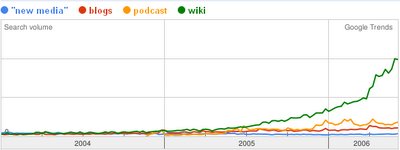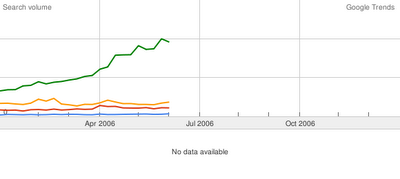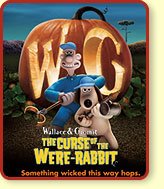
Yes, I know, it should not happen. There are all the reasons why a PR company should not blast out a hundred copies of a release and then follow each one up with a phone call...
'Hi my name is Samantha from Best in the World PR, we sent you a press release about The Greatest Company on Earth and I wanted to see if you would be using it ...... I will email you a another copy now .... let me get back to you about that .....'
It does happen... But will it be relevant in the new era as the newspapers move from
1665 to 2006.
Lets first consider the
New Media Release first.
- Its technical
- You loose control because technology can pick up the content and mash it.
- It might not be interpreted by a journalist
- It could find its way into blogs.
- Why adopt a process that is going to put people out of a job and reduce billable hours?
Lets stay where we are.
OK.
But, over the last few years, the number of journalists both staff and freelance has been dropping like a stone. They are very busy, they get a zillion emails and even printed press releases, there are a host of phone calls and they are expected to output story after story like a sausage machine.
Having time to garner the stories the editor needs, checking back on facts and sources and writing is one thing, using, even trusting, feeds arriving from some on-line
aggregator is suspect, time consuming and a pain. But... hang on, there is some merit in being able to get past the marketing speak to the story and having lots of available background to give journalistic depth and
their own spin. Perhaps for the Journalist there is some advantage.
Disrupting their day is hard and tiresome for both parties when its human. When it is computer driven, it has all the attributes of a punch bag.
There has to be a better way.
Yes there is but, at face value, neither party is going to like it much.
The machines can do a lot more. There is a computer programme that can combine past editorial, current press releases, blogs and
wikis and create mashed up content that is founded in historic reportage and current PR outputs leavened with academic research and papers and flavoured with social (blogs etc) content. The
amount of content such programmes can review and include into relatively short articles is stunning. The resulting texts are very readable,
germane and comprehensive. Unlike present content, the computer can be limited in the
amount of content it will use from a single writer, title, publisher or genre of information. Yes, its
plagiarism but of significantly lesser degree than current reporting and much less circular and worrying than the current model exposed by
shown by Chris Patern earlier this year.
The output might need editing ( I have seen it and, yes, it needs editing into good grammar), but that is a heap better that all the work involved in
researching and writing most stories.
I can envisage a day when news outlets deploy such programmes (very soon too).
What then happens to the PR agency and the journalist?
The PR agency is OK. It has to find more copy, more angles, deeper background
briefing and content (sounds, pictures, video and even avatars in some cases), and interference in social media leavened with facilitating face to face (Oh! all right -
Skype to
Skype) conversations with key opinion formers. Its role gets bigger even if the skill sets change.
The Publisher get a big bonus. They have access to much more content, a wider range of content and can fill the new on-line
pipeline 24 hours a day using automation. They never run out of news. It is current and cheap.
In addition journalists are
relieved of the mundane. They can have more rewarding jobs in part because they do not have to be a sausage machine and in part they have access to the
mashup of historic and current comment from which to take a new
different and interesting perspectives.
If one takes the topic of the day in the UK, the 'orderly transition of the Leadership of the Labour Party', the new and news content was available electronically. It came as historic media and on-line news and comment and new blog posts and press releases. That kind of content can be automated. The added value was in private briefing and commentary, which once published, goes into the common pool of news.
One can see the difference between automated 'news' and journalist input.
The key here is that the real and actual voice of the journalist is present at his/her outlet and is 'mashed' for all other outlets.
What I see
coming from these
developments is celebrity journalism. Hugely valuable, hard working, very well connected and expert journalists.
There is an element of win win here.
And for us, the news consumer?
We can 'pull' the information we need, when we need it and then can indulge in that relationship that the media always brought to its readers, as
Guy Consterdine put it, reading a favourite magazine is like talking with a friend. We can get the popular 'mash up' news and as a treat a personality journalist take on it.
Of course,
these organisations that still want to hide behind firewalls will be fine. Just marginalised.
In the 17
th through 19
th Centuries all of the papers practiced an "advocacy" journalism, it is genre that can adapt and perhaps be more honest than the "objective journalism" of the 20
th Century.
How brave the publishers can be is evident from the Daily Telegraph which is investing heavily in its on-line future but who will be next and who will really adopt the
semantic web as the backbone of media.
Picture: The Telegraph Hub
published by the Press Gazette today:
"The Daily Telegraph is promising to revolutionise the production process of its journalism with what it believes will be the UK’s first truly integrated multi-media newsroom at its new offices at London Victoria."









